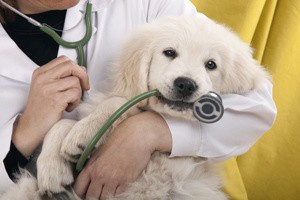Zoe’s took in 3 puppies yesterday and heartbreakingly discovered that one of them has Parvovirus. She is currently being treated at the animal hospital.
What is Parvovirus?
Canine Parvovirus is a sentence that causes the hearts of rescuers to drop. It is a terrifying virus, not just for the pup but for an owner who may have been unaware of its intensity. Parvovirus is a virus first recognized around the 1970s that compromises a dogs immune system. Even with intense hospitalization, survival can be low.
How can I tell if it is Parvovirus?
A pups symptoms will show within a few days. Lethargy is a huge sign, as well as loss of appetite, vomiting, or blood in the feces. If your dog shows any of these signs, call the vet immediately. Even if your dog has just been acting “out of the ordinary” – call anyway, don’t take the chance.
What will happen if a pup is tested Positive?
A 5-7 day intensive and costly hospital stay is required. The dog will be monitored and given fluids constantly as she will be vomiting and dehydrated. Drugs to help the immune system such as antibiotics will be given. A blood transfusion is also possible. Her intestinal system will be attacked by the virus and all that can be done is to assist her body in fighting it off. Sometimes permanent intestinal damage can remain, even though the pup has pulled through. Often, the dehydration itself or a secondary infection may be too much for the body to handle. The pup may remain contagious for a period of time and therefore precautions should be taken which will be discussed below as well as neighbours notified so they can get their dogs checked.
How can you kill the Virus?
Parvovirus is an extremely resistant virus and it has been known to survive for long periods of time and in extreme conditions, even on non-organic surfaces. It is a fecal-to-oral virus, and therefore it is important to use a solution with at least 1/30 parts bleach to disinfect items such as the bottoms of shoes. Items such as toys can be thrown out, and some people even resurface their yards.
How can I prevent my puppy from getting Parvovirus?
There are a few very important things you can do to make sure you ward this virus off. The biggest one is to VACCINATE your dog. A puppy will need his first round of shots around 8 weeks, again at around 12 weeks and finally at around 16 weeks. However, an older dog may need a round as well if his vaccination history is unclear. It is essential to remember that the puppy is NOT immune until his full round of shots are done. The shots then need to be updated on a regular basis throughout his life. As a susceptible puppy, even placing him down on the floor of PetsMart before vaccinations are complete can be a risk. Some dogs may be carriers and still appear to be perfectly fine. Although some breeds may have a larger risk, often it is more due to environmental stress, other parasites or viruses, and of course age, that increases the risk the most.
Can Me or my Feline get Parvovirus?
This particular virus affects canines only, not humans, or felines. Other vaccinations are necessary for felines, especially for the Feline Leukemia Virus.
Bottom Line: VACCINATE!
By Julie Kraus
To Donate towards our Parvovirus Treatment/Prevention Fund, please click the link: http://www.zoesanimalrescue.org/product/parvovirus-treatment-fund/






